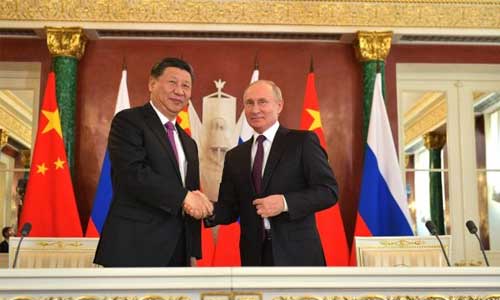The Central Asian region is a very important region as far as its strategic location is concerned. It is basically a bridge between East and West, and can even be considered an important pathway connecting North to South. Moreover, the region is gifted with energy resources, that can be useful both for the region and the energy hungry states around it. Because of the same facts, Russia and China have important interests – including both geo-economic and geo-political in the region. While with the rise of China and Russia, particularly, after the economic crisis of 2008, the significance of Chinese and Russian relations and interests has multiplied. Russia and China have pursued their interests in Central Asia through Shanghai Cooperation Organization (SCO), Silk Road Economic Belt, Eurasian Economic Union (EAEU) and Collective Security Treaty Organization (CSTO). Two of the mentioned initiatives – SCO and CSTO – are vital in understanding the Russian and Chinese Role in Central Asia; therefore, they are discussed below;
Shanghai Cooperation Organization:
As the name suggests, SCO was formed in Shanghai (China) in June 2001. Primarily, it had six members: China, Russia, Kazakhstan, Tajikistan, Kyrgyzstan and Uzbekistan. Currently, the organization has eight members, since Pakistan and India were also granted full membership in the historical meeting of the Heads of the State Council of the organization in June 2017. Addition of India and Pakistan made the organization more important; however, it is yet to be seen how it can play a role in bringing the Central Asian and South Asian states closer.
The main objectives of SCO include: strengthening mutual trust among the members states; promoting cooperation in the domains of economy, trade, research and technology, culture, education, energy, tourism, and protection of environment; maintaining peace and security in the region. Though these objectives seem promising, all of them have not been achieved by the organization so far. Moreover, it has gained importance only recently, as China has started exerting more influence in the region because of its large-scale economic plans.
The most recent meeting of the SCO members was held on 14th June 2019, where they came up with a joint declaration, highlighting the importance of creating a multi-polar world, and cooperation among the regional countries for security and stability. It also called for connecting the SCO and its members with the international community and international organizations for international peace and cooperation.
Though SCO is an important organization for Central Asia, it is basically dominated by China. In the future, it may remain relevant because of the Chinese growing influence in Central Asia. However, its role in connecting Central Asia to South Asia may remain limited, because of the China-India and Pak-India relations. Moreover, the individual efforts on the parts of the state to safeguard their interests are more dominant at the international political scenario. Therefore, Central Asian countries may also look at their relations with China based on their individual relations, instead of looking it from the perspective of a unified Central Asia. At the same time, Russia’s role in the organization is not as much as it should be, thus limiting its capacity to play any dominant role in the international arena.
Collective Security Treaty Organization (CSTO):
CSTO is an important organization for Russia and for the Central Asian region in security domain. The organization was formed in May 1992, after the heads of six states - Russia, Armenia, Kazakhstan, Kyrgyzstan, Tajikistan and Uzbekistan - signed the Collective Security Treaty. Later in 1993, the members became nine after Azerbaijan, Georgia and Belarus also joined the organization.
The objectives of the organization include: making efforts for peace, promoting regional and international security and stability and forming a collective security dependence mechanism. The collective security is the most important objective of the organization. As per Article 4 of the treaty, the security of the member states are bound together; therefore, any attack or aggression on any member will be considered attack or aggression against all the member states. And, if such an attack takes place, all the member states will work jointly to thwart the attack or aggression, which they are entitled as per the Article 51 of UN Charter.
Considering the scenario at the time, when the Central Asian countries were newly separated from the USSR, the treaty was significant. It was a guarantee that the independence and sovereignty of new states would be guarded. For Russia, it was necessary to form such an organization to keep its influence in the region and at the same time make sure that instability in its neighborhood does not threaten its security.
Later, in 1999, six of the member states – Russia, Belarus, Armenia, Kazakhstan, Kyrgyzstan and Tajikistan – signed extension of the treaty; however, Georgia, Azerbaijan and Uzbekistan seized their memberships. Nevertheless, the importance of the organization could not be underestimated as it kept on ensuring regional security cooperation. And, in 2002, it further rose to significance after a charter was designed for it, which was approved by the United Nations and the organization became observed in UN General Assembly.
CSTO, undoubtedly, is dominated by Russia. Being a major player and contributor, with the absence of any other major power, CSTO furthers Russian security interests in Central Asia. Other countries of CSTO can benefit from the security assistance provided by Russia; however, that depends largely on the conditions set by the Russian interests. Nevertheless, the security support provided by Russia to the Central Asian states may also be motivated by the fact that Russia would not want insecurity in its neighborhood that can threaten its own security. This phenomenon can help other countries derive their interests from the organization.
Home » Opinion » Growing Role of China and Russia in Central Asia
Growing Role of China and Russia in Central Asia
| Sajjad Aasim

